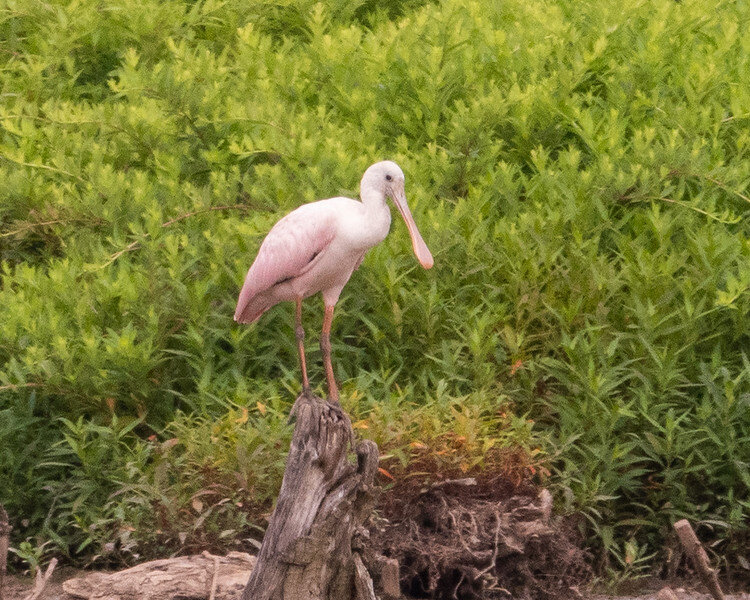Photo: Roseate Spoonbill, Dixie Sommers
Will Rare Sightings for Roseate Spoonbills Become a Common Occurrence?
Jessica Bigger
Roseate Spoonbills (Platalea ajaja) with their brilliant pink plumage, are one of those resplendent birds that attract birders from all over the world. Their most unique feature is their quirky, spoon-like bills, which help them search and catch their prey. They would fit right in with the other crazy bird characters Alice discovered in the forest of Wonderland.
Roseate Spoonbill, Dixie Sommers
Usually, you have to go down as far as southern Florida or Texas to catch a glimpse of these amazing birds – they can also be seen down in Mexico, Central and South America, but this year Northern Virginia birders flocked to Huntley Meadows for a rare opportunity to see these birds. The first confirmed sighting was on June 26. Since then, Roseate Spoonbills have also been seen at Hunting Creek Bridge near Alexandria, on the edge of the Anacostia River and even at Kenilworth Aquatic Gardens. They were still in our region at the end of August.
Roseate Spoonbills hang out on the water’s edge moving their spoon-shaped bills back and forth searching for crustaceans and aquatic invertebrates. Unlike egrets and herons, who bend over to reach their prey, spoonbills keep their football-shaped bodies horizontal when swishing back and forth for food. These shorebirds forage in marshes, estuaries, and fresh water ponds, lakes and rivers. Watch one of our visiting spoonbills foraging at Huntley Meadows in Dixie Sommer’s video here.
Just like flamingos, spoonbills get their pink plumage from the crustaceans and aquatic invertebrates they eat which have carotenoids that turn their feathers pink. Juveniles tend to be lighter pink than adults.
Like Black-crowned Night-Herons, Roseate Spoonbills stick together. You’ll tend to find them roosting in mangroves, cypress and even willow trees, making grunting calls when they are startled.
Surprisingly, Roseate Spoonbills are not born with a spoon-shaped bill. The chicks have similar bills to other heron and egret chicks. A Roseate Spoonbill chick’s bill starts to flatten out nine days after it’s born. In 16 days, the bill starts to resemble a spoon.
Roseate Spoonbills are a species of concern in Florida and Louisiana. According to National Audubon Society, climate change can create numerous threats to the population: spring heatwaves can harm nestlings, heavy rain can flood nests and prevent adults from feeding their chicks, and as sea levels rise, more coastal habitat will be consumed by rising waters. Dan Rauch, a wildlife biologist with the D.C. Department of Energy and Environment, who was interviewed by NPR believes that we will continue to see an earlier hurricane season caused by climate change, which may be pushing spoonbills further north. The Roseate Spoonbills we’ve seen may have been blown off course when Hurricane Elsa barreled through in June.
Climate change isn’t the only threat. Last winter, the Environmental Protection Agency handed Florida the responsibility to award permits for development in the wetlands. Even though this shift of responsibility helps streamline the permitting process, many environmentalists believe that this change is a green light for significant development in wetland areas, which would be detrimental to all wildlife that rely on the wetlands for shelter and food.
Here is a video of a Roseate Spoonbill foraging at Huntley Meadows, taken by Dixie Sommers.
Sources:
https://www.allaboutbirds.org/guide/Roseate_Spoonbill/id
https://www.audubon.org/field-guide/bird/roseate-spoonbill
https://www.audubon.org/news/in-floridas-plan-take-over-wetland-permits-critics-see-gift-developers


